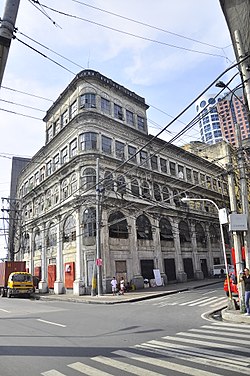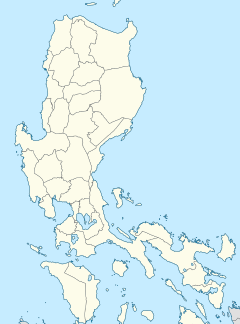El Hogar Filipino Building
| El Hogar Filipino Building | |
|---|---|
 The building in 2011. | |
| Alternative names | El Hogar |
| General information | |
| Status | Abandoned |
| Architectural style | Neoclassical and Renaissance |
| Address | Juan Luna Street corner Muelle de la Industría, Binondo |
| Town or city | Manila |
| Country | Philippines |
| Coordinates | 14°35′46″N 120°58′32″E / 14.59611°N 120.97556°E |
| Completed | 1914 |
| Design and construction | |
| Architect(s) | Ramon Irureta-Goyena and Francisco Perez-Muñoz |
El Hogar Filipino Building, also known simply as El Hogar, is an early skyscraper in Manila, Philippines. Built in 1914 and located at the corner of Calle Juan Luna and Muelle dela Industría in the Binondo district, El Hogar Building was designed by Ramon de Irureta-Goyena and Francisco Pérez-Muñoz in the Beaux-Arts style. Its architecture reflects elements of Neoclassical and Renaissance styles.
El Hogar Building was built as a wedding present of Antonio Melián Pavía, 3rd Count of Peracamps, to his bride Margarita Zóbel de Ayala, who was a sister of Enrique Zóbel de Ayala in 1914. During its heyday, El Hogar Building housed the Sociedad Mútua de Préstamos El Hogar Filipino, a financing cooperative founded by Melian, and the offices of Smith, Bell and Company[1]
It survived World War II and a number of earthquakes and is one of two remaining American-era structures in the area facing the Pasig River. Right across Calle Juan Luna, on its northern front, is another important edifice, the Pacific Commercial Company Building or commonly known as the First National City Bank Building which was built in 1922.
The value of the building is its architecture, which is a representation of American period design, materials, and construction method. El Hogar Building is a representation of the architecture of business establishments of that era. It also has a collective value as one of the significant structures within the historic Binondo district and Escolta Street, along the cultural landscape of the Pasig River.[2]
References
- ^ Sembrano, Edgar Allan. "El Hogar to be torn down?". Philippine Daily Inquirer. Retrieved February 17, 2014.
- ^ "NHCP Encourages Adaptive Reuse of El Hogar Building in Binondo". Archived from the original on September 4, 2014. Retrieved March 11, 2014.





